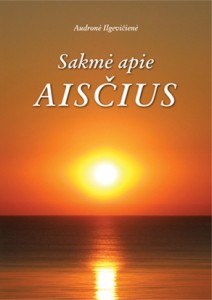Warning: Declaration of SLB_Content_Handlers::get() should be compatible with SLB_Base_Collection::get($args = NULL) in /home/antropoteo/domains/anthropotheosophy.com/public_html/wp-content/plugins/simple-lightbox/includes/class.content_handlers.php on line 97
 The book is an address to those who are Aesti in their hearts.
The book is an address to those who are Aesti in their hearts.
The nation is at crossroads now. It leads towards self-destruction or revival. It is time to speak up!
The lives of many nations have died into the oblivion. The houses built by them have turned to dust, the wind has burried their work by sand, soil or water with no trail left behind. Nothing survived but that does not mean nothing was there. It is only human memory that is so short.
The divine memory is eternal. The divine memories are kept in the Celestine books of the Holy Universe. One shall find everything in them. The Creation of the worlds, the Holy Scriptures or the Cosmic Rule that controls everything is in those books. The stories of the celestine and earthly human beings, their deeds and their work are described in them. Nothing is missed in them. Every thought, every word and every work on earth is accounted for in them. Those books compile the Holy Library where the holy books never turn to dust.
The history of the world does not know the beginning of it. What is history? How it is born? How does a human beeing become aware of it? Who tells him history? Are those Strangers or the ones that know the National Spirit?
While humans spoke one tongue, there was peace. Symbols where given to them so they could relate while the languages were developing. Later symbols turned into letters. The appearance of a written language distorted the essance, therefore, the wise men tried not to write down their wisdom at all times.
Hence isn’t it so that everything that is written in history is only reflections of what took place in reality? How will those who do not love, know or even hate the country or its traditions and customs will writing history? How will the one who lives in the country and loves it will describe it? How do they write history now?
Time has been changing peoples’ mentality, the meanings of symbols and values. Inevitably, one can get easily mislead in the labyrinth of the old perseptions. Valueless are the debates of the outstanding scientists regarding the understanding and philosophies of various epoches.
The significant libraries of the world vigilantly hold manuscripts. But can we believe everything what is written in them, especially the rewritten texts and translations? Isn’t it so that an interpretation by the writer of the historic event or person according to how he understood it or was told to write? Can we call that history? Is that a saga or facts?
Are the stories of the historians more true than the ones written in the Celestine libraries?
Time has come to tell the story of the nation called Aesti. It is still alive. It still speaks its own language though the latter has altered a lot. It is still looking for its roots and not trusting the foreign historians much.
The story is about the Great March of Aesti. It tells us about the nation of Aesti and how they got on the way from the estuary of the river Nile to the Promised Land by the Baltic Sea.
This is a story of the nowadays Lithuanian and Latvian roots, Prussians being extinct, unfortunately. It is a reminder to those speaking one of the oldest surviving languages in the world about their glorious ancient past. No attempt by foreign historians shall ever hide the Spirit of it under the covers of interpreted history.
The wisdom of the Spirit opens up to those who believe in their roots. Only those children of this honorable nation who believe in the roots of it shall be able to use the wisdom now. But we speak not to mourn for the past. We speak up so that the genetic memory treasures open up to those able to use its potential now.
It is needed to those who care about the future of the nation, and are ready to sacrifice their lives for it, just like the ancestors used to do.
The book is an address to those who are Aesti in their hearts.
The nation is at crossroads now. It leads towards self-destruction or revival.
Therefore, we speak up.
Those who have ears shall hear.
Those who have eyes shall see.
Those who have hearts shall rise.
Ilgevičienė A. Sakmė apie aisčius. – Vilnius, „Tiamata“, 2011, 260 p.
Ilgevičienė A.The Saga of Aisčiai –Published by „Tiamata“, in Vilnius, 2011, 260 pages.
